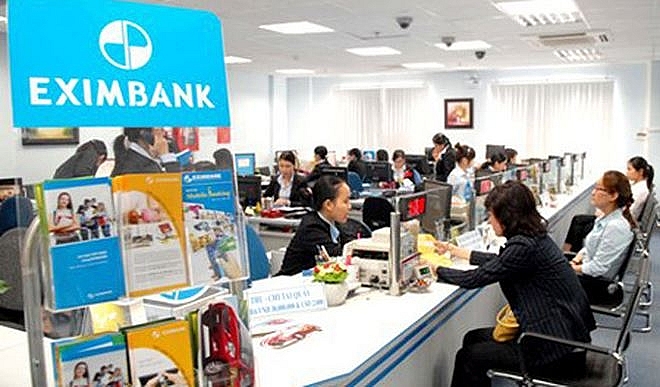Bank stock auctions less charming than before?
 |
| Vietcombank's recent attemp to divest from Eximbank saw poor results |
On October 17, the Hanoi Stock Exchange (HNX) announced cancelling the auction of a batch of Eximbank (EIB) stocks owned by Vietcombank because no investor registered.
This was Vietcombank’s second failure as on October 15, the bank also saw flat results in the auction of Military Bank (MBB) stock.
The bank’s capital divestment from EIB and MBB were to match the State Bank’s Circular 36/201/TT-NHNN that regulates minimum safety limits and ratios in banking operations because Vietcombank’s current ownership in these two banks are above the regulated 5 per cent.
Particularly, at the MBB stock auction, Vietcombank offered to sell 53.4 million shares at the starting price of VND19,641 ($0.85) apiece.
After the deadline of placing deposits to purchase stocks, only 10 investors (five corporate and five individual) registered to buy a total of 5.9 million shares, equal to 11 per cent of the total stocks put on offer.
Eventually, only one individual investor bought 10,000 MBB stocks at the average bid price of VND21,900 ($0.95). All the remaining unsold stock will be sold by Vietcombank through order-matching in the stock market.
Earlier, Vietcombank staged three auctions to sell all of its stake in Ho Chi Minh City-based commercial lender Orient Commercial Bank (OCB).
The situation has posed the question whether investors are no longer keen on bank ticker auctions.
The starting price of the MBB stock at the recent auction was VND19,641 ($0.85) apiece while that of EIB was VND14,497 ($0.63). Under current regulations, the selling price must not be lower than the closing price of this stock in the bourse on the day the auction is held.
| The situation has posed the question whether investors are no longer keen on bank ticker auctions. |
On October 17 (the auction day), EIB was traded below the set starting price, making the stock less attractive to buyers. Since then, the ticker continued falling.
From the investor angle, Tran Hoang Linh, a veteran investor with a particular interest in bank tickers, commended: “MBB and EIB are all listed. MBB was traded in the range of several million units in each trading session, the traded volume of EIB ticker was a bit lower.In this context, auctions have become less attractive to investors, given that the stocks are readily available in the market. Besides, participating in auctions involved an inconvenient amount of administrative work.”
P. Lam, another investor, opined, “The stock market is very volatile at this time, and the MBB and EIB tickers are on a downward trend. As the auction price is to be based on the market price, buying shares on the stock market when their price go down is smarter.”
From the expert angle, Tran Dinh Dung, head of the Financial Consultancy and Issuance Underwriting Department under Saigon-Hanoi Securities JSC (SHS), said that the auction format which was popular more than a year ago is now “outmoded” and less appealing to domestic investors.
Foreign investors, as banking is a conditional business field subject to foreign ownership limit, take a cautious approach.
In addition to the current unfavourable market conditions, Dung commented that the current method of price fixing is one reason behind investors’ indifference towards recent capital divestment auctions.
The current method of price calculation for state capital divestments at auctions in light of government Decree 32/2018/ND-CP is putting investors at a disadvantage.
Decree 32/2018, which came into force in May 2018, amends and supplements some contents of Decree 91/2015 that regulates state capital investment in businesses as well as the use and management of state capital and assets in businesses.
Accordingly, the successful bid price must not be lower than the ticker’s actual price on the stock market, and this has put investors at a disadvantage due to current volatility in stock price.
To tackle the situation, Dung suggested a more ‘open’ price setting method under which listed firms will be allowed to use a starting price set by their consultancy units and not be too reliant on the ticker price on the stock market.
What the stars mean:
★ Poor ★ ★ Promising ★★★ Good ★★★★ Very good ★★★★★ Exceptional
Related Contents
Latest News
More News
- Foreign leaders extend congratulations to Party General Secretary To Lam (January 25, 2026 | 10:01)
- 14th National Party Congress wraps up with success (January 25, 2026 | 09:49)
- Congratulations from VFF Central Committee's int’l partners to 14th National Party Congress (January 25, 2026 | 09:46)
- 14th Party Central Committee unanimously elects To Lam as General Secretary (January 23, 2026 | 16:22)
- Worldwide congratulations underscore confidence in Vietnam’s 14th Party Congress (January 23, 2026 | 09:02)
- Political parties, organisations, int’l friends send congratulations to 14th National Party Congress (January 22, 2026 | 09:33)
- Press release on second working day of 14th National Party Congress (January 22, 2026 | 09:19)
- 14th National Party Congress: Japanese media highlight Vietnam’s growth targets (January 21, 2026 | 09:46)
- 14th National Party Congress: Driving force for Vietnam to continue renewal, innovation, breakthroughs (January 21, 2026 | 09:42)
- Vietnam remains spiritual support for progressive forces: Colombian party leader (January 21, 2026 | 08:00)

 Tag:
Tag:


























 Mobile Version
Mobile Version